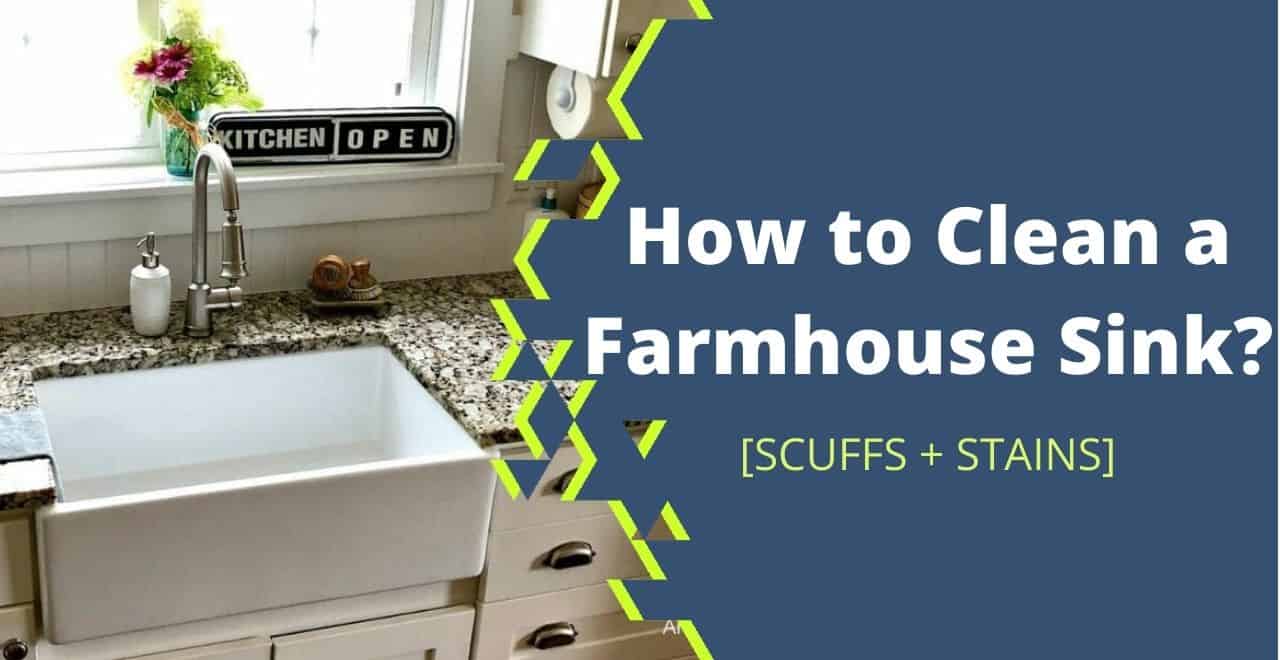It’s spring cleaning time, and deep cleaning your oven is one of the most unpleasant tasks you’ll have to complete to make your kitchen pristine. Cleaning your oven of all the harsh, baked-on food and grease requires an equally challenging cleaning, where oven cleaners come in.
Can you, however, use the same to clean and rub your kitchen counters?
Also, Grease build-up is a problem in ovens. Homeowners may notice a severely coated coating of oil that is difficult to remove with ordinary cleaners if they don’t clean regularly.
Therefore, oven cleansers help remove stubborn stains and grease from your oven, but they’re not meant to be used as general kitchen cleaners. Also, Oven cleaners include chemicals that are strong, poisonous, and corrosive. Thus they should not be used on kitchen surfaces.

Why Are Oven Cleaners Harmful to Your Kitchen Countertops?
Oven cleaners are strong and therefore consist of many toxic chemicals. Thus, these chemicals can harm your health by getting into your food, causing food poisoning, ruining your kitchen surface, and fading color.
For instance, the food you’re preparing (while chopping vegetables, for example) might combine with leftover oven cleaner residue on your counters, causing chemical reactions that eat away at the kitchen surface even more.
Harmful chemicals in oven cleaners:
- Caustic soda/Sodium Hydroxide/Lye – Alkaline substance with a PH of 14, highly corrosive.
- Ethers – Highly volatile substance.
- Ethylene glycol – Highly toxic if ingested.
- Methylene chloride – Highly flammable, carcinogenic, and should not be touched with bare hands.
- Turpentine
- Degreasers
- Foaming agents
- Crystallization agents
- Butane
- Monoethanolamine (MEA)
- Monobutyl ether
- Diethylene Glycol
When strong chemicals come into touch with the oil and grease in the oven, they create a boiling reaction that eats away at the oil, grease, and grime. This makes cleaning the oven a breeze. However, the same approach cannot apply to washing kitchen counters.
How Do These Chemicals Affect Your Kitchen Countertops?
Firstly, sodium hydroxide is a caustic chemical used in most oven cleaners. Additionally, sodium hydroxide is a strong alkaline (basic) substance that can help you get rid of obstinate dirt. This chemical can be used safely on almost any surface when properly diluted.
So, the most damaging chemicals in oven cleaners for your countertops are :
1) Ammonia
2) Bleach
3) Sodium Hydroxide
4) Alcohol
Although there is a protective coating on your kitchen countertops, it is usually fragile. Furthermore, it helps shield the kitchen surface from minor scrapes.
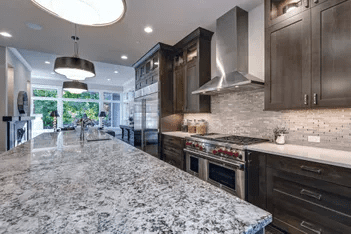
Source: HomeAwakening.com
On the other hand, the heavy-duty oven cleaning might damage and penetrate the protective layer of the kitchen counters due to its cocktail of chemicals.
Effects of chemicals in the oven cleaners on kitchen countertops:
| Chemical substance | Type of countertops | Affects |
| Lye (sodium hydroxide) | Wood countertops | Strips away the finish, makes it sticky and gummy, permanent stains, and becomes prone to bacterial growth. |
| Natural stone countertops | Break the protective sealing, causing spots and permanent discoloration. | |
| Tile countertops | Break the top glaze and weaken the grout. | |
| Aluminum and steel countertops | Permanent discoloration | |
| Formica countertops | Destroys the finish, and permanent staining, and makes the material prone to chipping. | |
| Alcohol (ethanol or MEA (monoethanolamine)) | (Synthetic materials)VinylFormicaCorian. | Permanent discoloring |
| Wooden countertops | Dull the finishing |
So, what are the effects of oven cleaners on different kitchen countertops?
Wooden and Butcher Block Countertops
When using an oven cleaning, wooden kitchen surfaces with a transparent or varnish layer are the most vulnerable. The oven cleaner’s chemicals quickly permeate the top layer of the kitchen countertop, softening it and turning it sticky.
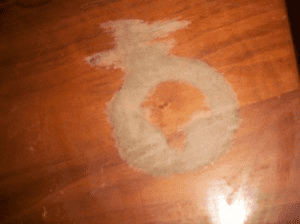
To keep germs at bay, wooden countertops have a veneer laminated finish. The oven cleaner’s sodium hydroxide causes a chemical reaction on the wooden countertop’s surface, eating away at the wood layers. This often leaves holes and pores on the surface. Also causes a bubble gum-like feel.
The same results can be obtained by using oven cleaner on a butcher’s block.
Tile countertops
Flat glazed tile countertops have a matte surface, whereas glossy glazed tile countertops must be glossy. Regardless, both look stunning as kitchen counters.
The exterior glaze finish on tile counters creates a basic and smooth surface. This glaze coating can be ruined by using oven cleaners on it. As a result, your tile countertop will be uneven, and food preparation will be difficult. Oven cleaners should be avoided at all costs.
Expert says the chemicals such as Caustic Soda (NaOH) in the oven cleaning are alkaline in nature. Gradually it eats away at the top glaze if you put too much NaOH for a too long time, causing considerable damage to the kitchen countertop.
Natural stone
Countertops made of stone are far more durable than those made of other materials. It’s because natural earth stones like granite, marble, and soapstone are used as countertops. Even though these are natural earth stones, they will deteriorate if oven cleaners are used. The color can be harmed by sodium hydroxide, generally known as lye.
Marble and sealed granite kitchen countertops, for example, maybe more durable and resistant to oven cleaning than other materials.
However, washing natural stone counters using an oven cleaner is not suggested. While using an oven cleaner may not cause significant harm to these kitchen counters, the finish will undoubtedly lose its luster, becoming drab and spotted.

Laminate Countertops
Firstly, Formica or laminate kitchen countertops, like stone kitchen worktops, are less likely to be damaged if you clean them with an oven cleaner and quickly rinse and wipe the kitchen countertop. However, color degradation is always a possibility.
Formica countertops are also a long-lasting material, albeit they can be ruined if oven cleansers are used on them. Therefore, we strongly advise against using oven cleansers to clean Formica countertops.
However, oven cleansers can disfigure the finish and ruin the color of Formica. Thus, use Formica countertop cleaner instead of oven cleaner.
Quartz Countertops
Comparatively, quartz countertops are the most vulnerable to deterioration and color change. This is because this kitchen counter style is an engineered stone, often known as “manmade stone,” which is created using specialized dyes to provide color.
Because of the severe impacts of oven cleansers, these artificial colors are far more prone to color degradation. In these situations, natural rocks are significantly more durable.
In short, when compared to other stones, quartz is more delicate. The use of oven cleaner on quartz surfaces over an extended period of time can cause discoloration and degradation.
Bonus Read: Is It Possible to Put a Coffee Machine on A Quartz Counter?
Stainless Steel Countertops
Although, stainless steel countertops are mostly used in restaurants. However, some people have begun to use this stain-resistant and easy-to-clean countertop material in their homes as well.
Oven cleaners do not usually damage stainless steel, although they can leave stains on the surface. Regularly using an oven cleansers is also dangerous to one’s health because it can easily enter the food prepared on its surface.
Although stainless steel can survive oven cleaners in some cases, using oven cleaners is not recommended. Also, in this method, you can jeopardize someone’s health.
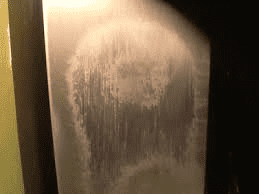
In short, the chemicals in oven cleaners generally discolor stainless steel, depending on the composition. Some steel counters may withstand the spray, but the danger is not worth it, as the chemicals could contaminate food prepared on the surface later.
How Do These Chemicals Affect Your Health?
| Hazardous chemicals in oven cleaners | Type of substance | Health risks |
| Lye (sodium hydroxide) | Corrosive, Poisonous | Skin: Rashes, itching, burning sensation, chemical burn, and permanent scars. Eyes: Burns, swelling, pain, and blurred vision. Ingestion: Nausea, vomiting, stomach cramps, and diarrhea. |
| Diethylene glycol monobutyl ether (also called 2-butoxy ethanol) | Volatile, Carcinogenic | Dizziness, Lightheadedness, Coughing and wheezing, Nausea, Vomiting, Damage to liver and kidneys, Damage to fetal development. |
| Ethylene Glycol | Volatile, Poisonous | Eye irritation and swelling, Throat, and respiratory tract irritation. |
| Methylene Chloride | Solvent, Carcinogenic hazardous | Headaches, Dizziness, Nausea, Eye irritation, Damage to the liver, kidney, and cardiovascular system. |
| Petroleum Distillates | Volatile | Headaches, Drowsiness, Nausea, Eye irritation, Throat irritation, Skin Irritation |
What Are the Alternatives to Using Oven Cleaners on Kitchen Countertops?
While the harsh chemicals in oven cleaners are fantastic for all the baked-on grease and filth in your oven, their effect on kitchen countertops can be disastrous, even destroying them completely.
Fortunately, some safer but effective alternatives to consider for kitchen countertop cleaning and maintenance.
Warm water and mild soap/detergent: So, this simple mixture is safe to use daily and will keep your counters clean for many years.
Vinegar: Firstly, pour four parts (400 ml) of water into a spray bottle. Then, add one part of white vinegar (100 ml) to this.
Kitchen countertop cleaners: In short, you can try cleaners specially made for counters. Moreover, there are a plethora of them available on the market. Make sure you get one that is appropriate for your countertop material.
- Meyer’s Clean Day Multi-Surface Everyday Cleaner: It’s made with natural ingredients, is cruelty-free, and won’t harm your kitchen counters or your health.
- Better Life All-Purpose Cleaner: There are no chemicals or alcohol in this plant-based all-purpose cleaner, so it won’t harm your kitchen surfaces or irritate your skin.
- TriNova Granite Cleaner and Polish: To clean granite, marble, and quartz countertops without streaking or dulling the finish. It also works on laminate, Formica, Corian, and other surfaces.
- Miracle Wipes for Granite and Stone: So, the PH-balanced composition will not dull the stone finish and will enable you to see the wonderful veining and color patterns on your countertops. Sulfates, parabens, alcohol, and other chemicals are also absent.
- Cerama Bryte Stainless Steel Polish: Dirt, fingerprints, smears, and stains are all removed. It also contains mineral oil, which protects the surface and leaves a gleaming, streak-free finish.
Alternative cleaners based on the type of countertops
| Types of countertops | Alternative cleaners to be used | What are their effects |
| Wooden countertops | non-abrasive cleaner warm water mixed with a little white vinegar rub half a lemon with salt Apply oil or wax | Removes stains Strengthens the protective sealing Prevents warping and cracking of the material |
| Stone, marble, and granite countertops | Regular cleaning with soap, water, and a microfiber cloth Resealing | Prevents from liquids penetrating through the material Prevents staining or getting dull |
| Quartz countertops | Regular cleaning with soap, water, and a microfiber cloth Use PH balanced chemicals only. | Prevents liquids from penetrating through the material Prevents it from staining or getting dull |
| Laminate countertops | with water, liquid detergent, and a soft cotton cloth | to Prevent discoloration and to keep the surface hygienic. |
| Steel countertops | Buy cleaners that are specifically made for steel Mild detergent, water, and cloth | Help remove stubborn smudges |
What if you have already used oven cleaners on your countertops?
As mentioned above, oven cleaners can cause great damage to your countertop materials. And, what if you have already used oven cleaners on your countertops, so how can you remove the stains and damaged it has caused?
So, here are some things you can d in such a case.
Polishing
Firstly, the easiest way out is to polish your countertop materials. If your counters are constructed of stone, tile, or anything else that isn’t wood, you should clean them completely with conventional countertop cleaning tools before polishing them.
Oiling
Another thing that you can do is oil up your wood countertop. So if you have a wood countertop or butcher’s block that has been cleaned with oven cleaning, make sure to clean it completely first with soapy water or a specialist wooden countertop cleaner.
Therefore, after cleaning and drying the surface, apply a specialist wood oil to help restore the color to the kitchen counter and make it look as good as new.
![Granite Vs. Marble Vs. Quartz Countertops [12 Differences+Pros & Cons] Granite Vs. Marble Vs. Quartz Countertops [12 Differences+Pros & Cons]](https://houseadorable.com/wp-content/uploads/2022/03/quartz-marble.jpg)
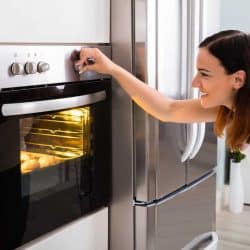
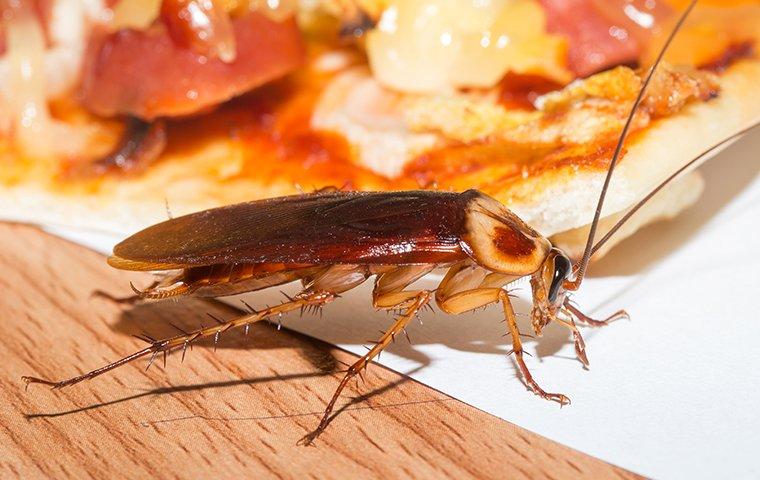
![How To Clean Grease Off Laminate Kitchen Cabinets? [Full Guide] How To Clean Grease Off Laminate Kitchen Cabinets? [Full Guide]](https://houseadorable.com/wp-content/uploads/2022/06/cleaning-cabinets-cover.jpg)
![How to Season A Cutting Board? [Simple Steps Explained] How to Season A Cutting Board? [Simple Steps Explained]](https://houseadorable.com/wp-content/uploads/2022/12/cutting.jpeg)
![Can You Stain Cutting Boards? [Methods+Stain Alternatives] Can You Stain Cutting Boards? [Methods+Stain Alternatives]](https://houseadorable.com/wp-content/uploads/2022/11/cutting-board.jpg)
![Granite vs. Laminate Countertop [Pros and Cons+10 Key Differences] Granite vs. Laminate Countertop [Pros and Cons+10 Key Differences]](https://houseadorable.com/wp-content/uploads/2022/03/Granite-vs.-Laminate.jpg)
